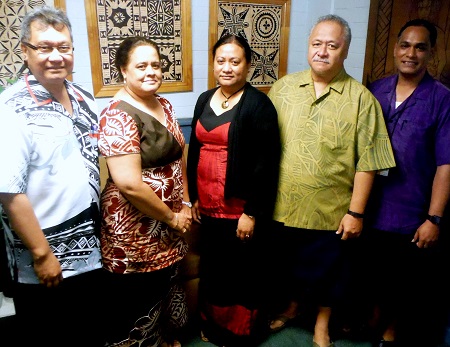
To begin the fall 2015 semester, administrators at ASCC last week hosted a Convocation, centered on the topic of Accreditation, for faculty and staff. (Left to Right): Vice President of Administrative Services Dr. Mikaele Etuale, Acting President/Vice President of Academic and Student Affairs Dr. Rosevonne Makaiwi Pato, Dean of Academic Affairs Mrs. Letupu Moananu, Community and Natural Resources Dean/Director Tapa'au Dr. Daniel Aga, and Office of Institutional Effectiveness Director Mr. Sonny Leomiti. (Photo: J. Kneubuhl)

To begin the fall 2015 semester, administrators at ASCC last week hosted a Convocation, centered on the topic of Accreditation, for faculty and staff. (Left to Right): Vice President of Administrative Services Dr. Mikaele Etuale, Acting President/Vice President of Academic and Student Affairs Dr. Rosevonne Makaiwi Pato, Dean of Academic Affairs Mrs. Letupu Moananu, Community and Natural Resources Dean/Director Tapa'au Dr. Daniel Aga, and Office of Institutional Effectiveness Director Mr. Sonny Leomiti. (Photo: J. Kneubuhl)
ASCC Convocation Focuses on Accreditation Progress
August 18, 2015
y James Kneubuhl, ASCC Press Officer
The American Samoa Community College (ASCC) traditionally begins each spring and fall semester with a Faculty Orientation. For its fall 2015 term, the College for the first time started off with a Convocation, or meeting of stakeholders, centered on the topic of Accreditation for the benefit of both the ASCC faculty and staff. The Convocation, which took place on August 10th and 11th, served as a means to familiarize and update all ASCC internal stakeholders on the progress made over the last several months in the effort to remove the institution from its current status under sanction by the Accrediting Commission for Community and Junior Colleges (ACCJC), a division of the Western Association of Schools and Colleges (WASC).
In February of this year, ASCC received word that WASC-ACCJC had issued an order for ASCC to Show Cause, an action taken when the Commission finds an institution to be in substantial noncompliance with its Eligibility Requirements, Accreditation Standards, or Commission Policies. As a result of this action, ASCC is required to submit a Show Cause Report by October 15, 2015, which will be followed by a visit by a WASC ACCJC external evaluation team. The report will provide ASCC with the opportunity to Show Cause why its accreditation should not be withdrawn by demonstrating that it has corrected deficiencies noted by the Commission and is in full compliance with Commission requirements.
Since being placed under sanction, five ASCC Subcommittees have been formed to review, plan, and address the official Recommendations made by WASC-ACCJC. Four of the Subcommittees, comprised of ASCC stakeholders, focus on the areas of Academic Excellence; Staffing; Total Cost of Ownership; and the Leadership Triangle. The Board of Higher Education comprises a fifth Subcommittee to address Recommendations specific to them. The Convocation highlighted the progress of these Subcommittees, along with a full overview of the accreditation process provided by Acting President/Vice President of Academic and Student Affairs Dr. Rosevonne Makaiwi Pato, Vice President of Administrative Services Dr. Mikaele Etuale, Office of Institutional Effectiveness Director/Accreditation Liaison Officer Mr. Sonny Leomiti and Dean of Academic Affairs/Assistant Accreditation Liaison Officer Mrs. Letupu Moananu.
Dr. Pato led off the Convocation with a review of the ASCC Mission and Core Values before explaining in detail the Show Cause sanction as well as the nature of the 10 WASC-ACCJC Recommendations, which ASCC is currently working to address. Dr. Etuale followed with a review of Best Practices, emphasizing the need to strengthen ASCC’s own definition of these practices in compliance with accreditation expectations. Director Leomiti and Dean Moananu, who also serves as the ASCC Accreditation Liaison Officers, offered an in-depth view of the process employed by the Subcommittees to address the WASC-ACCJC Recommendations, as well as the expected outcomes and recommendations of the Subcommittee’s efforts emphasizing institutional effectiveness and quality assurance.
“Collaboration is one of the core ASCC values,” explained Mr. Leomiti, “and our purpose for the Convocation was to give the faculty and staff a full understanding of the WASC-ACCJC Recommendations and what is being done to address them. While we give credit to the Subcommittees for their hard work and to our administration for their support and leadership during this challenging time, we also hope to instill the idea that accreditation ultimately depends on all the stakeholders, and the better the understanding they have of what standards need to be met, the more effectively we will work towards the lifting of the WASC-ACCJC sanction.”
ASCC continues to be accredited during the period of Show Cause and until the Commission acts to either withdraw accreditation, or when the WASC-ACCJC issues and concerns that initiated Show Cause are fully resolved and the institution is removed from sanction.
